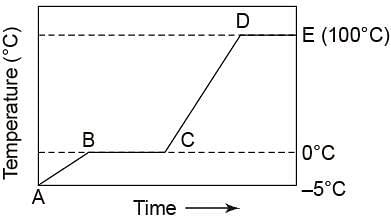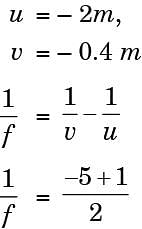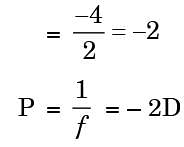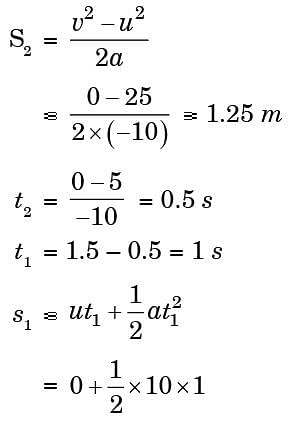National Level Solved Paper (SAT) - 2016-17 - Class 10 MCQ
30 Questions MCQ Test NTSE for Class 10 - National Level Solved Paper (SAT) - 2016-17
Small cut pieces of soft stems are placed in growth medium with following plant hormones. Which combination of plant hormones will show slowest growth ?
Which one of the following demonstrates the characteristics of cardiac muscle cells?
| 1 Crore+ students have signed up on EduRev. Have you? Download the App |
From the given figure identify the part of human brain controlling most of the involuntary actions:
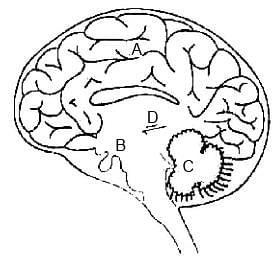

An animal kept in a jar has the following features.
(I) It is bilaterally symmetrical.
(II) It has coelomic cavity
(Ill) The body is segmented
(IV) It has jointed appendages.
To which phylum does the animal belong to?
Read the following statements and select the correct option.
Statement-I : Nostoc and Bacteria are prokaryotes.
Statement-II: Penicillium and Spirogyra are fungi.
You find a herbaceous flowering plant growing in your school garden having leaves with parallel venation.
Choose the correct additional features the given plant would be possessing.
(I) It has no secondary vascular tissues.
(II) Its flower possesses three sepals.
(Ill) It possesses tap root.
(IV) Its embryo has 2 cotyledons.
Varieties of vegetables such as cabbage, broccoli and cauliflower have been produced from a wild cabbage species. Such process of producing new varieties of living organisms is called
Which of the following are pairs of analogous organs?
(I) Forelimbs of horse - Wings of bat
(II) Wings of bat - Wings of butterfly
(III) Forelimbs of horse - Wings of butterfly
(IV) Wings of bird - Wings of bat
Which of the following organisms is used as a biopesticide ?
Which one of the following pairs of causative agent and type of disease are correct?
(I) Leishmania - Sleeping sickness
(II) Nematode - Elephantiasis
(III) Trypanosoma - Kala azar
(IV) Staphylococcus - Acne
Pancreatic juice contains more than one enzyme. Which among the following combination is correct?
You discover a new species of a plant. You also discover that it produces motile sperms and dominant generation has diploid cells. It belongs to
At every 20 mintues, one bacterium divides into two. How many bacteria will be produced after two hours, if one starts with 10 bacteria ?
The metal (M) forms an oxide, M2O3. The formula of its nitride will be
A solution is a homogeneous mixture of two or more substances. Which of the following is a solution?
1.80 g of glucose is dissolved in 36.00 g of water in a beaker. The total number of oxygen atoms in the solution is
35Cl and 37Cl are the two isotopes of chlorine, in the ratio 3 : 1 respectively. If the isotope ratio is reversed, the average atomic mass of chlorine will be
The turmeric solution will turn red by an aqueous solution of—
A metal ‘M' of moderate reactivity is present as its sulphide ‘X' . On heating in air, ‘X' converts into its oxide ‘Y' and a gas evolves. On heating ‘Y' and ‘X' together, the metal ‘M' is produced. ‘X' and ‘Y' respectively are—
Which one of the following statement is incorrect about graphite and diamond?
The functional groups present in the following compound are-
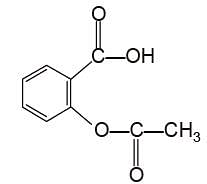
A part of the modern periodic table is presented below in which the alphabets represent the symbols of elements.
Table
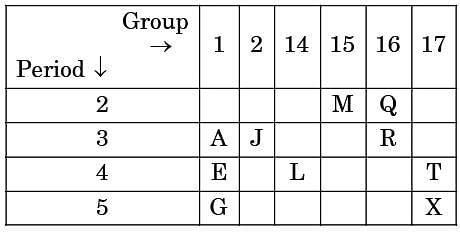
Consult the above part of the periodic table to predict which of the following is a covalent compound.
A compound ‘X' reacts with a compound ‘Y', to produce a colourless and odourless gas. The gas turns lime water milky. When ‘X' reacts with methanol in the presences of concentrated H2SO4, a sweet smelling substance is produced. The molecular formula of the compound ‘X' is
The schematic diagram is given below.
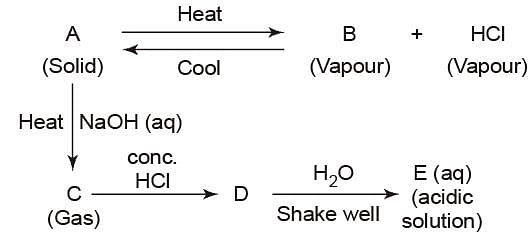
Q. Which of the following is an incorrect statement?
Which of the following is a feasible reaction?
Some ice pieces kept at a temperature – 5°C are heated gradually to 100°C in a beaker. The temperatures of the contents are plotted against time. The correct plot is-
The velocity-time grap h of an object moving along a straight line is shown below:
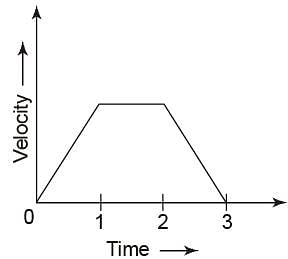
Which one of the following graphs represents the acceleration (a) - time (t) graph for the above motion?
To read a poster on a wall, a person with defective vision needs to stand at a distance of 0.4m from the poster. A person with normal vision can read the poster from a distance of 2.0 m. Which one of the following lens may be used to correct the defective vision ?
A ball released from rest at time t = 0 hits the ground. It rebounds inelastically with a velocity 5 m s–1 and reaches the top at t = 1.5 s, What is the net displacement of the ball from its initial position after 1.5s? (g = 10 m/s-2)
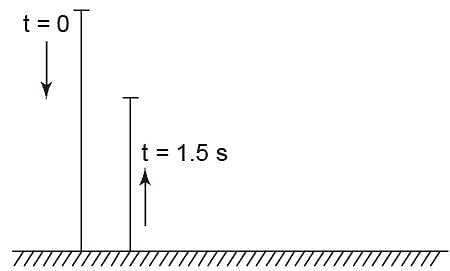
|
338 docs|163 tests
|


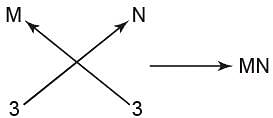


 CH3COOCH3 + H2O
CH3COOCH3 + H2O